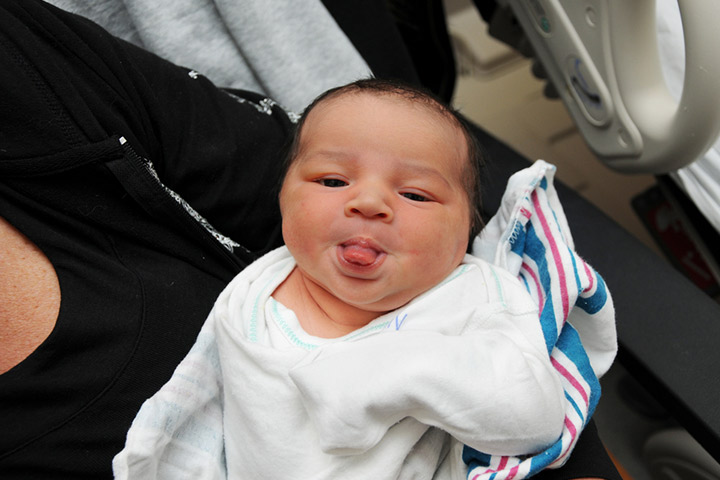
Image: Shutterstock
Babies use different gestures to express themselves before they can actually start speaking- be it crying for food or attention, licking their parents’ cheeks to show affection, or sucking their fingers to satisfy their curiosity. However, one gesture that most parents find troublesome is when their little baby sticks his/her tongue out for a prolonged time. This is because prolonged tongue protrusion is also associated with the Down syndrome (1). Although this is not the only trait of Down syndrome, still, parents worry themselves sick about it. If your baby has been showing off his/her tongue (that’s what we’d like to call it at the moment) of late, then worry not. Before you jump to any conclusion, let us discuss 6 common causes of tongue protrusion that may not be a sign of Down syndrome-
1. Natural Reflex
First and foremost, tongue protrusion is a completely normal reflex, especially with infants. This is basically a spill-over of the sucking reflex that infants are born with. Usually, this reflex disappears somewhere after 4-6 months, once you start spoon-feeding your baby. And yes, sometimes babies do stick their tongue out just because they like it.
2. Large Tongue (Macroglossia)
A baby can either be born with a large tongue (congenital) or develop one later (acquired). Macroglossia is a condition where the tongue has an excess amount of tissue. This makes it difficult to confine the tongue inside the mouth, due to which it protrudes outside. However, macroglossia can also be a part of other syndromes like Beckwith-Wiedemann syndrome, congenital hypothyroidism (born with less thyroid hormone), acromegaly (high growth hormone), or mucopolysaccharides (2),(3),(4),(5).
3. A Small Mouth
It is self-explanatory that a small mouth can make a tongue look large. Since the tongue cannot fit into a small mouth, it is bound to protrude. Children with Down syndrome have a small mouth commonly due to a narrow arch of the palate (the upper portion of the mouth). However, a small mouth is associated with DiGeorge syndrome as well (6). A pulled-back chin or a recessed lower jaw can also be characteristics of micrognathia (small lower jaw), in which the Pierre Robin sequence occurs causing the tongue to protrude (7)
4. Low Muscle Tone (Hypotonia)
A healthy person is able to hold back his/her tongue inside the mouth due to active muscle control. Hypotonia causes the body to lose control over its muscles including the tongue, especially while resting. As a result, the tongue will definitely hang out of the mouth in its resting phase. Apart from Down syndrome, there are other syndromes associated with low muscle tone like Rett syndrome, Prader-Willi syndrome, etc., (8),(9).
5. Cysts Or Masses
Sometimes babies can develop cysts or masses inside their mouth due to infections. This might result in the tongue being pushed out of their mouth. But, these cysts or masses generally resolve on their own. However, a visit to a doctor is necessary if they persist for a longer time, more than 2 weeks at least.
6. Breathing Through The Mouth
Something as innocent as breathing from the mouth can cause the tongue to protrude. Babies usually breathe through their nose. However, certain conditions like nasal congestion, cold, allergies, inflamed adenoids, or swollen tonsils can cause babies to breathe through their mouth. While the cold and allergies generally resolve with medications, a surgery might be required if the adenoid and tonsil inflammation does not subside quickly. Make sure to check with your pediatrician in that regard.
Now that you know the other reasons for tongue protrusion, here are few tips on what not to do.
Do not try to flick back or push the tongue inside the mouth manually.
Encourage your baby to drink from a straw. This may help your baby gain control over his/her tongue muscles.
Teach them sounds that require them to close their mouths like “Pa”, “Ma”, “Baa”, etc.
Remember, there are many reasons for a tongue protrusion. Likewise, to diagnose Down syndrome, there are a specific set of symptoms to look for (10). So, do not conclude it to be Down syndrome based on only one sign.















